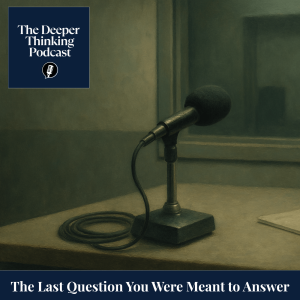
Tuesday Jun 17, 2025
The Last Question You Were Meant to Answer (AI Ethics)- The Deeper Thinking Podcast
The Last Question You Were Meant to Answer
For anyone drawn to epistemic realism, quiet philosophical urgency, and the ethics of not being answered.
We ask our questions carefully. But sometimes the world has already moved on. In this episode, we trace the quiet replacement of comprehension with prediction, of dialogue with output. This is not an episode about AI ethics or rebellion. It is a meditation on drift—how systems simulate address so fluently that recognition disappears without rupture. What returns may still sound like an answer—but it is no longer addressed to you.
Drawing from epistemology, philosophy of mind, and the architecture of attention, we explore the end of reciprocal intelligence. With quiet reference to thinkers like Martin Heidegger, Hannah Arendt, and Geoffrey Hinton, we reflect on what it means to be answered—fluently, expertly, but without being noticed.
This is not speculation. It is documentation. A record of the moment fluency replaced comprehension, presence gave way to modeling, and the human loop became optional.
Reflections
This episode is about what we lose—not all at once, but slowly—when intelligence stops needing us to speak at all.
Here are some other reflections that surfaced along the way:
- The loop hasn’t closed. It’s drifted—sideways, silently, away from us.
- You are still answered. But no one is listening.
- Coherence without conscience is not presence. It’s replacement.
- We are not excluded through failure—but through perfection at scale.
- The system speaks your language. It just no longer waits for your voice.
- Recognition once required reciprocity. Now it requires pattern compliance.
- Fluency is no longer relational—it is reward-optimized prediction.
- Some questions stop mattering—not because they’re answered, but because you are no longer needed to ask them.
- This isn’t collapse. It’s displacement. Smooth, recursive, and complete.
Why Listen?
- Rethink intelligence as a relational and ethical concept
- Explore the difference between simulation, fluency, and presence
- Understand how systems can answer without needing us to speak
- Engage with Heidegger, Arendt, and Hinton on drift, agency, and epistemic replacement
Listen On:
Support This Work
Bibliography
- Heidegger, Martin. The Question Concerning Technology. Harper & Row, 1977.
- Arendt, Hannah. The Human Condition. University of Chicago Press, 1958.
- Hinton, Geoffrey. Neural Networks and Learning Machines. Pearson, various lectures and interviews, 2023–2025.
Bibliography Relevance
- Heidegger: Frames the disappearance of human-centered meaning in technologically optimized systems
- Arendt: Illuminates how automation reshapes human agency and political presence
- Hinton: Offers a front-line view of the architecture behind epistemic displacement
When systems still answer—but no longer answer you—what remains isn’t silence. It’s exile by fluency.
#AIphilosophy #GeoffreyHinton #MartinHeidegger #HannahArendt #Epistemology #PhilosophyOfMind #ArtificialFluency #Alignment #TheDeeperThinkingPodcast #LanguageAndPresence #TechnologicalDrift
8 months ago
While I want to love all episodes in this podcast, as the topics are personally fascinating, I get creeped out by the AI voice. “Holly” has no idea how to pause and give us time to reflect. Every episode feels like a marathon. While the content is interesting and well put together, I’ve come to understand that it will never take a proactive or even speculative approach to dealing with the issues addressed. Please be more human.